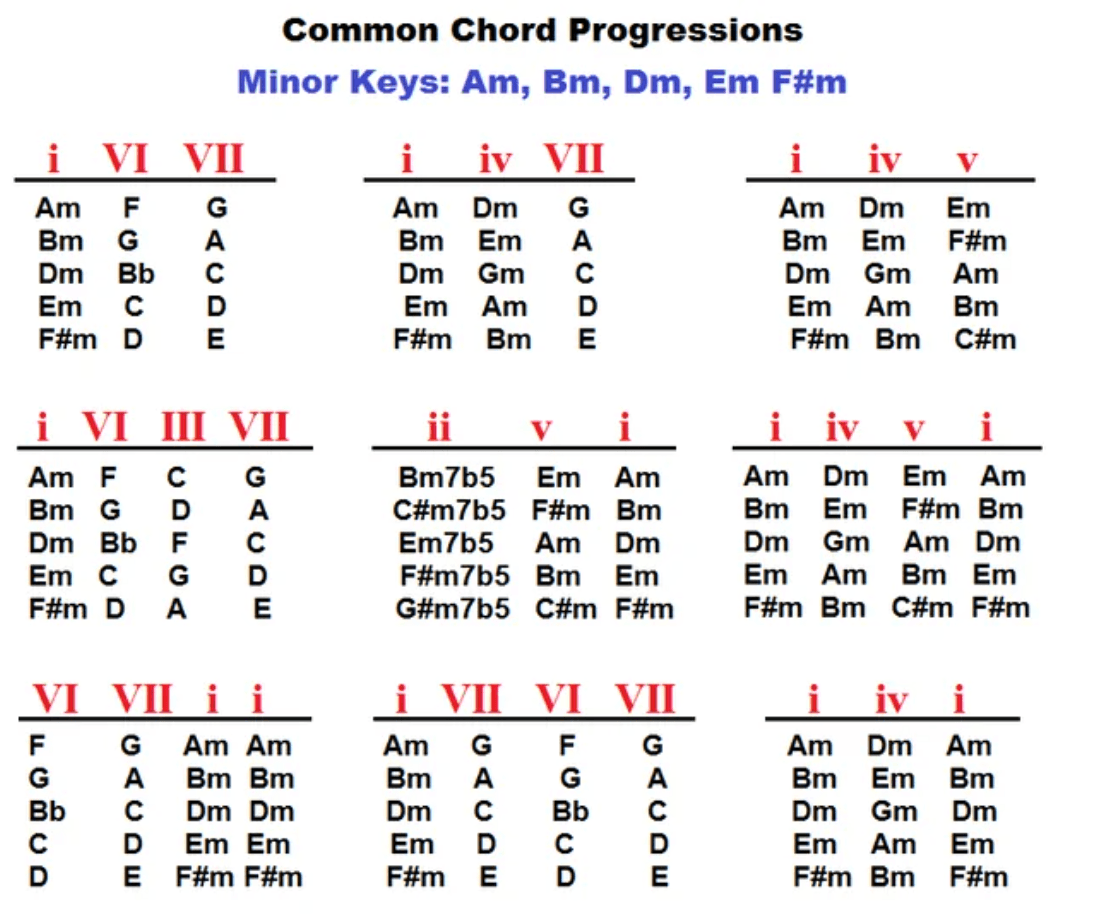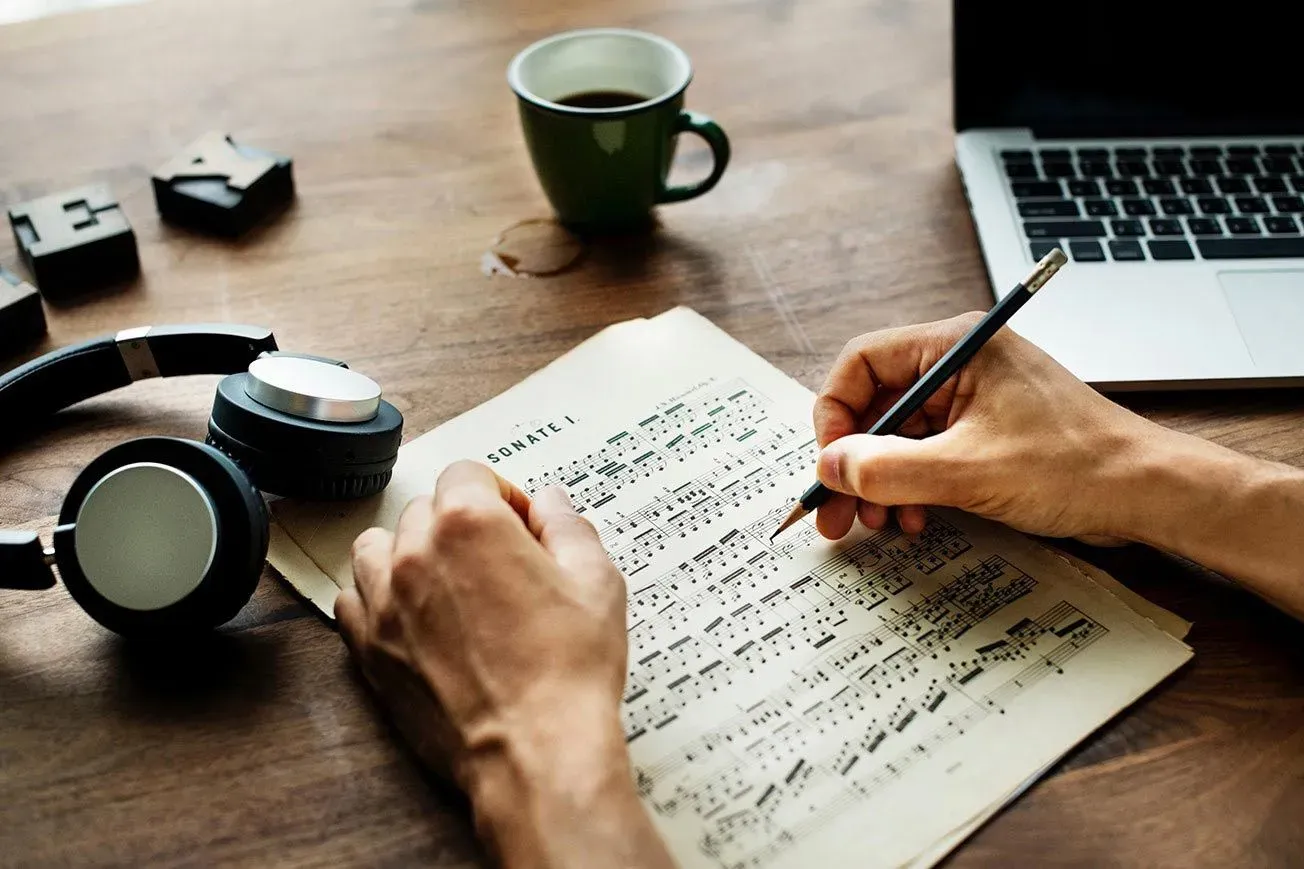Ever felt the frustration of a creative block while composing?
AI music composer comes as a breakthrough, revolutionizing the way you can create music.
Let's unravel how artificial intelligence can aid in your composition process, offering endless inspiration and personalized tools to match your unique needs.

Learning to Compose: What Does It Take?
Embarking on the journey of music composition is much like learning a new language.
It's about understanding the nuances, emotions, and rhythms that resonate.
With AI music composer by your side and a burning passion, you're set to express your musical thoughts.
Let's explore.
The Fast Track to Composition
Composing is about creating an experience, an emotion, and a connection.
1. Understanding Musical Fragments: It's important to be familiar with different musical fragments. Be it a chord, a tune, or a rhythm, every piece plays its role in the bigger picture.
2. Experimentation is Key: Once familiar, it is important to be comfortable in altering these fragments. Maybe reversing a rhythm or adjust a chord. Such changes not only deepen your understanding but also pave the way for unique compositions.
3. Expressing Loudly and Authentically: The end goal? A piece that is original and speaks volumes. Something that communicates your emotions, thoughts, and visions clearly and loudly.
Personal Motivation for Composing
Music is the voice of the soul. It's a medium to convey feelings, tell stories, and connect with others.
Emotional Expression: Music serves as an outlet. Feeling elated, gloomy, or nostalgic? It is the perfect time to translate these emotions into a melody.
Achieving Musical Milestones: Whether it's creating a hit song or simply a tune that resonates with a few, every composition is an achievement.
Leveraging AI in Composition: The introduction of the AI music composer has transformed the audio production landscape. From generating tunes based on moods to suggesting alterations, AI facilitates and enriches the composing process.
Utilizing Listening Experiences and Background Knowledge
Every individual's connection with music is unique. This personal touch is what makes every composition distinctive.
Personal Music Journey: A past experiences, be it playing the trumpet in a school band or listening to vinyl records, play a pivotal role. These memories influence style and preference.
Learning from the Past: Music has a rich history, with compositions that have withstood the test of time. Understanding past genres, rhythms, and styles can provide inspiration for modern tunes.
Use Helpful Tools like the AI Music Composer
In the realm of audio production, musicians and composers often find themselves in need of inspiration, guidance, or simply a spark to get started.
This is where Empress AI Music Tools come into play.
Let's check out the array of specialized AI tools that promise to change the way you approach music composition.
1. Melody Mind: Your Personalized Melody Assistant
Create various tunes and melodies for inspiration!
How It Works: Melody Mind, the AI melody generator, streamlines the process of melody creation. Want to experiment with a melancholic tune on a piano in E minor set to Jazz?
Or perhaps a vibrant tune on a flute in G major aligned with a Folk genre?
It's all possible.
Just input your desired instrument, chords, genre, and BPM.
Before you know it, various tailored melodies are ready for review.
2. Lyric Lab: Crafting Stories with Precision
Bring Your Song's Narrative to Life
How it works: Coming up with lyrics can take some time, and sometimes a little push in the general creative direction can be helpful! Lyric Lab is a helpful tool that can provide many options for verses, chorus and other phrasings that can match a musician's vision.
Maybe something reminiscent of a futuristic Sci-Fi realm?
Or penning down verses with an ominous undertone?
With Lyric Lab, simply provide the genre, tone and theme and review the manifold as artificial lyric options.
3. Chord Candy: The Backbone of Every Song
Harmony at Its Best
How it Works: Chord progressions set the mood and foundation for any musical piece. With Chord Candy, the AI chord generator, you can experiment and find the perfect harmony by inputting your preferences.
4. Song Idea Generator: Thematic-Driven Compositions
Channel Emotions into Melodies
How it works: Whether you're composition's theme is euphoric, melancholic, or introspective, the Song Idea Generator can generate various options based on a thematic creative direction.
Input your composition's theme/emotion and review various ideas generated by AI.
5. Bass Brain: The Pulse of Your Composition
Lay Down the Rhythmic Foundation
How it works: Bass Brain is an AI tool designed for bass line generation, and to ensure optimal integration with various musical genres and contexts. Simplifying the art of creating compelling bass lines, especially for those composers who have not been blessed with the bass genes.
By inputting details like bass type, chords, genre, and BPM, you’re set to review various bass lines that can have potential to complement your compositional direction.
6. Drums De Dior: Setting the Rhythmic Tone
The Heartbeat of Your Track
How it works: Drums dictate the energy and rhythm of a song. With Drums De Dior, specify your genre and BPM, and let the tool craft a drum beat that aligns with your musical vision.
7. Harmonious Hitmaker: Elevate Your Song Titles
From Ordinary to Extraordinary
How it works: A catchy song title can make all the difference. With Harmonious Hitmaker, infuse your theme and genre into titles, turning them into potential chart-toppers.
Composer Need-to-Know Basics
The journey of a music composer is paved with both challenges and opportunities.
While natural talent is a boon, a systematic approach and understanding of the basics can significantly impact a composer's growth and innovation.
Here's are some need-to-know basics into the foundational principles every budding composer should be aware of.
Setting Restrictions to Spark Creativity
Less is Often More.
The Power of Limitations: Paradoxically, sometimes having too many options can stifle creativity.
By placing self-imposed restrictions, you can effectively channel your creative energy.
For instance, composing a one-note piece might sound simple, but when you're confined to define the tempo, time signature, key signature, and instrument, the challenge pushes you to think outside the box.
Focusing on Specific Composition Skills
Step by Step, the Journey Unfolds.
Laying the Foundation: In the realm of composition, this translates to mastering basic skills first.
Whether it's understanding how to write a note accurately or deciphering musical symbols, these are the building blocks.
Scaling Up: Once the basics are ingrained, one can venture into more complex compositions.
Starting with a short piece or motif and then building it up to a grand symphony ensures that the learning process is seamless and effective.
Understanding the Term "Compose Music"
Crafting Originality.
Beyond Replication: True musical composition goes beyond mere imitation. It's not about recreating what's already been done or solely chasing novelty.
Instead, it's the art and science of forming an authentic piece of music by combining various elements in a harmonious manner.
The Role of AI: In modern times, AI music tools can play a pivotal role in assisting composers.
They can offer a fresh perspective, optimizing the process, ensuring that the outcome is both original and appealing.
The Unique Challenges and Goals of Learning to Compose
Foreseeing Hurdles and Overcoming Them.
Recognizing the Roadblocks: The journey of composition is not without its challenges.
From the overwhelming vastness of musical possibilities and occasional bouts of inspiration drought to the intricate task of transcribing or a shaky foundation in music theory – these are hurdles almost every composer encounters.
The Grammar of Music
Music, akin to language, has its own structure, rules, and expression.
Understanding this "grammar" is fundamental for anyone aiming to make their mark in the world of composition.
Let’s look into what makes the music resonate and the steps to mastering its intricate grammar.
Understanding Music Notation
The Alphabet of Music.
1. Reading the Notes: Just like you need to recognize letters to read a book, in music, you need to recognize notes to understand a composition.
It's the foundational step, and while it might seem daunting initially, there are abundant resources available.
With a simple online search, numerous guides, and courses spring forth, designed to help beginners understand the nuances of music notation.
2. Fluency Over Familiarity: While the basics of reading music might be straightforward, becoming fluent in it, much like a language, demands practice.
It's one thing to recognize a note and entirely another to instantaneously know its sound, duration, and role in a composition.
Delving into Music Theory
Building a Vocabulary.
Fundamental Blocks: Just as sentences are built with words, music compositions are crafted with elements like scales, triads, and seventh chords.
These serve as the building blocks of music.
To the layman, a major or minor chord might just be an identifiable sound.
But to a composer, it's a tool, a word with specific meaning and intent.
Aural Knowledge vs. Deep Understanding: Most of us, thanks to the music we've heard throughout our lives, possess an aural recognition of these elements.
We can identify a tune, a chord transition, or a melody. However, as a composer, this passive knowledge isn’t enough.
The key lies in understanding the why and how behind these elements.
What makes a major chord uplifting? Why does a minor chord evoke melancholy?
Stepping Stones: For those familiar with reading music but looking to delve deeper, courses like the "beginner's composing course" can serve as an excellent bridge.
Such structured learning paths, often available online, break down the essentials of music theory into digestible lessons, making the learning journey smoother.
The Logic of Music
Comprehending the Vocabulary of Composition.
From Basics to Composition: Once you're comfortable with music's language and its basic vocabulary, the next milestone is understanding its syntax - how do you structure these elements to craft a composition?
Much like constructing a sentence using words, composing involves structuring musical elements to convey a message or emotion.
Decoding the Expected: The beauty of music lies in its universality.
Across cultures and regions, certain musical guidelines or rules are consistent.
These shared rules become part of our listening experience.
We expect a song to follow certain progressions, and these expectations shape our emotional response.
Harnessing Expectations: A seasoned composer knows how to play with these ingrained expectations.
Sometimes it's about delivering precisely what the listener expects, creating a sense of satisfaction.
At other times, it's about subverting these expectations, leading to surprise or intrigue.

Endless Possibilities Make Starting Easy and Finishing Hard
In the vast world of music composition, an ocean of possibilities can be both a boon and a bane.
While having countless avenues of exploration is exhilarating, it can simultaneously overwhelm the soul of a composer, especially when coupled with perfectionist tendencies.
The Burden of Freedom
The vastness of choices is like being in an endless bookstore where every book seems alluring.
Each melody, each rhythm, and each chord progression feels like it could be the beginning of something beautiful.
But too many beginnings often lead to very few endings.
Composers find themselves continuously starting new projects, propelled by the initial excitement of a new idea, but frequently abandoning them when they meet a crossroad or face a challenging decision.
Adding to the pressure is the prolificacy of great composers around the globe.
With platforms giving voice to musicians everywhere, we are constantly exposed to new and exceptional music.
This bombardment of quality music can create an intimidating environment, making it tougher to judge our work and progress objectively.
The Fickleness of Inspiration
Another facet of this challenge is the unpredictability of inspiration.
Like a bird, it might perch on one's shoulder for a fleeting moment, chirping melodies that seem to promise endless songs.
But just as suddenly, it can fly away, leaving a quiet void behind.
When inspiration does strike, it floods the composer with ideas.
But transitioning from an idea to a finished piece is where the waters get murky.
The problem is compounded by the reality that inspiration isn't an ever-present muse.
Its intermittent visits mean that composers often have reservoirs of ideas but struggle to transform them into cohesive pieces.
Thus, the need for strategies to harness these fleeting moments becomes paramount.
Taming the Beast: Setting Boundaries
The antidote to this overwhelming freedom is surprisingly counterintuitive: self-imposed restrictions.
By setting clear boundaries, a composer can channel their creativity more effectively.
These limitations can be thematic, technical, or even temporal.
For instance, one might decide to compose a piece only using a particular scale, or within a certain time frame, or conveying a singular emotion.
Such decisions act as a compass, directing the mind and simplifying the maze of choices.
It’s like giving a painter just three primary colors.
While it might seem limiting at first, it pushes the artist to explore depths they might have previously ignored, resulting in creations that surprise both the creator and the audience.
AI Music Toos: A Silver Lining?
In the backdrop of these challenges, AI some innovative options.
When faced with creative blockades, a tool like AI can be a gentle guide, nudging composers forward.
For instance, AI can provide variations on existing ideas, offering a fresh perspective on a melody that feels stuck or suggesting alternative progressions for a rhythm that feels repetitive.
It's akin to a brainstorming assistant who doesn’t tire, offering a myriad of suggestions for you to consider, modify, or even discard.
Check out the World of Empress AI
Explore your creative potential in music composition further with Empress AI! Whether you're battling creative blockades or seeking fresh perspectives, Empress is your go-to muse.
Let's redefine the boundaries of what's possible in audio production. Why stay confined when you can soar? Step into the future and elevate your compositions to new horizons.
Engage with Empress AI now, and let the symphony of innovation play. Your masterpiece awaits! Join the revolution today.
FAQs: AI Music Composer
Q1: What can AI music composer do for my audio production?
An AI music composer can streamline and elevate your audio production by generating melodies, harmonies, and rhythms tailored to your preferences.
Q2: Can beginners benefit from using an AI music tool?
Absolutely, beginners can greatly benefit from an AI music tool, as it provides foundational guidance and sparks creative insights in composition.
Q3: How can Empress enhance my original compositions?
Empress can infuse fresh nuances into your original compositions, making them more intricate and appealing to listeners.
Q4: Can AI tools like generators make personalized music?
Yes, AI tools like generators can craft personalized music based on specific inputs and preferences, ensuring a unique listening experience.
Q5: How can AI redefine the traditional ways of composing music? Engage with us in the comments!
AI is poised to revolutionize traditional composing methods by introducing efficiency, versatility, and a plethora of creative possibilities. Dive into this transformation with us in the comments!
Follow the future of music with Empress. Check out our blog to learn how you can effectively use these AI music tools.


